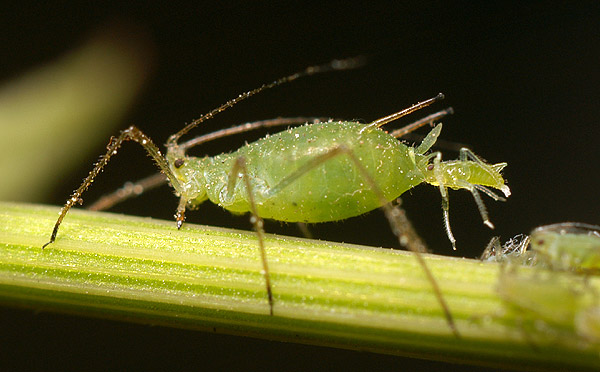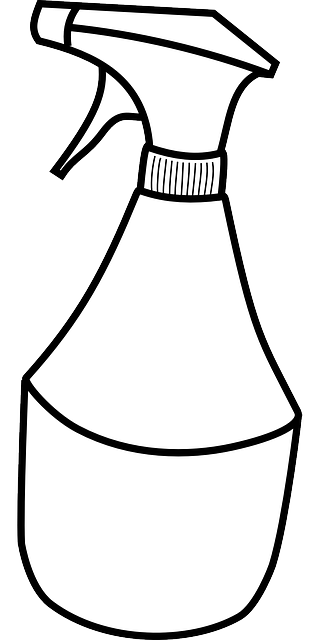In this series of articles, Growers Network talks about a few of the most common Cannabis pests you need to watch out for. Today’s topic: Aphids.

If any of you have spent any time in a garden, or even nature, you should be familiar with today’s pest: aphids. Aphids are found nearly everywhere there are plants on Earth, but tend to show up in regions that favor insect life (temperate to tropical). These little sap-suckers can make your life difficult, and can often be hard to get rid of.
So, without further ado, let’s explore the science of aphids.
Quick Look
- Common Name: Aphids, greenflies, blackflies, or plant lice
- Scientific Name: Aphids belong to the order Hemiptera, and are of the superfamily Aphidoidea
- Symptoms: Increase in disease incidence in plants, stunted growth, stunted or dying leaves and stems
- Timing: Any time
Aphids

Aphids are particularly annoying plant pests for several reasons:
- They like to hang out on the undersides of leaves and in shade, where they can be difficult to reach.
- Aphids drink the sugary-sap of most plants, often stunting or inhibiting growth of the plant. Sufficient numbers of them can kill plants entirely by drinking the sap dry.
- They often serve as carriers of plant diseases, and will transmit diseases to plants they insert their proboscis into.
- They can reproduce sexually or asexually -- a single female can theoretically infest an entire grow, and they can switch to sexual reproduction when stressed.
- Other insects like to feed off of the honeydew that some aphid species secrete. Ants in particular will “farm” aphids that produce honeydew, so if you have an aphid problem, you may soon have an ant problem to follow.
- Aphids can fly, and will be carried on the wind while they look for their ideal host plant.

As you can probably see, aphids are pretty bad for growing crops. Luckily, the vast majority of them are not microscopic and can be discovered with the naked eye before they become too big a problem.
Prevention
Prevention will largely depends on your growing facility. If you’re outdoors, you will need to consistently check your plants for any signs of an infestation. If you’re indoors or in a greenhouse, aphids should appear less frequently, but it’s still worthwhile to check regularly.
From there, there are a number of different approaches you can take to prevent aphids. Some methods may prove more useful than others:
- Natural predators such as ladybugs, mantids, assassin bugs, and nematodes can stop an aphid infestation before it really takes off. Some growers opt to regularly release these beneficials on or near their plants.
- Essential oil sprays will deter aphids, or can kill them. Soapy water sprays can also clog up aphid probosci, resulting in early deaths for the aphids.
- Plant companion plants that repel or attract aphids away from the cannabis. Some websites suggest marigolds and other flowering plants can attract aphids, while strong-smelling plants like onions or garlic can repel aphids.
- Indoor or greenhouse facilities that are designed with positive pressure will generally keep aphids out. The aphids will be unable to fly inside.
Treatment
Treatment of an infected grow will depend on the severity of the infestation and your grow. Hopefully you caught it early and can treat it relatively simply! Be sure to treat them as soon as you find them, or you may find yourself with an ant infestation or diseases spreading around your grow.
If Outdoors
- Strong blasts of water (IE from a hose) can knock aphids off of plants. However, this won’t kill the aphids.
- Beneficials such as ladybugs, assassin bugs, mantids, and nematodes can be released and will eat the aphids. These predators will generally stick around in the environment, although regular releases may help.
- Soapy water is known to clog up aphid probosci, killing them. If you find a group of them, get a spray bottle and mix 1 part dish soap with 10 parts water, and you have a pretty effective solution for removing aphids that is environmentally friendly.

If Indoors
- Most predatory beneficials should work indoors, including ladybugs, assassin bugs, mantids, and nematodes. However, release of these beneficials may need to be more frequent if they die out.
- Any insecticidal spray should kill aphids. Environmentally-friendly insecticides such as essential oils, neem oil, and more should work well.
- The soapy water trick, as mentioned above, should also work.
Conclusion
And there you have it. Aphids can be a real danger to any grow operation, but they’re probably one of the easier pests to treat for. Keep a vigilant eye and treat the problem before it becomes serious! And as always, stay tuned to Growers Network for more information about beneficials, diseases, and pests!
10 Best Gift Ideas for Cannabis Connoisseurs and Growing Aficionados (2022)
December 7, 2022Developing and Optimizing a Cannabis Cultivation System
December 14, 2021Dealing with Insomnia: How Can CBD Help?
December 10, 2020Your Guide to Sleep and CBD
December 7, 2020
Do you want to receive the next Grower's Spotlight as soon as it's available? Sign up below!

Do you have any questions or comments?

About the Author
Hunter Wilson is a community builder with Growers Network. He graduated from the University of Arizona in 2011 with a Masters in Teaching and in 2007 with a Bachelors in Biology.